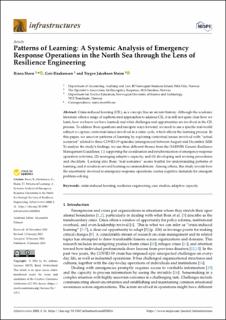Patterns of Learning: A Systemic Analysis of Emergency Response Operations in the North Sea through the Lens of Resilience Engineering
Peer reviewed, Journal article
Published version
Permanent lenke
https://hdl.handle.net/11250/3045281Utgivelsesdato
2023Metadata
Vis full innførselSamlinger
- Scientific articles [2181]
Originalversjon
10.3390/infrastructures8020016Sammendrag
Crisis-induced learning (CIL), as a concept, has an ancient history. Although the academic
literature offers a range of sophisticated approaches to address CIL, it is still not quite clear how we
learn, how we know we have learned, and what challenges and opportunities are involved in the CIL
process. To address these questions and navigate ways forward, we need to use a specific real-world
subject to capture contextual issues involved in a crisis cycle, which affects the learning process. In
this paper, we uncover patterns of learning by exploring contextual issues involved with “actual
scenarios” related to three COVID-19 episodes (emergencies) between August and December 2020.
To analyze the study’s findings, we use three different themes from the DARWIN Generic Resilience
Management Guidelines: (1) supporting the coordination and synchronization of emergency-response
operation activities, (2) managing adaptive capacity, and (3) developing and revising procedures
and checklists. Looking into these “real scenarios” seems fruitful for understanding patterns of
learning, and it results in several learning recommendations. Among others, this study reveals how
the uncertainty involved in emergency-response operations creates cognitive demands for emergent
problem-solving.

